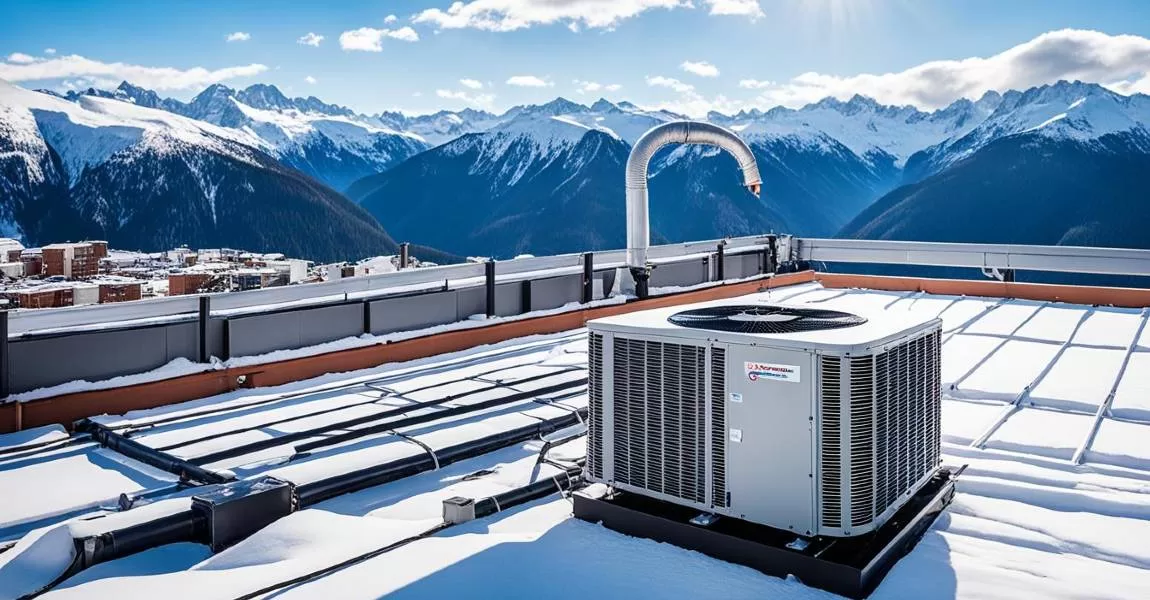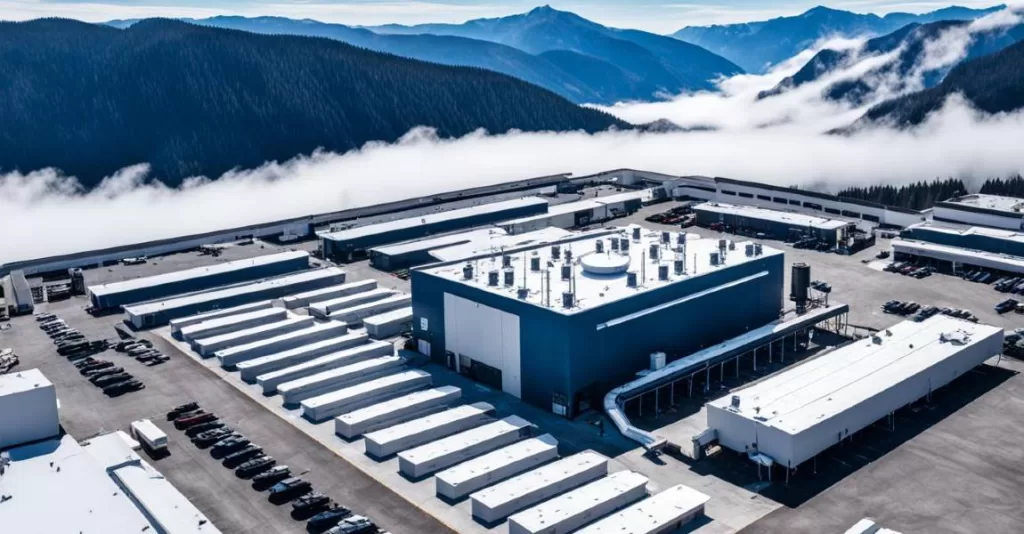As you escape to the tranquility of a higher elevation, have you ever wondered how the elevation might impact your home’s AC Efficiency?
High altitude HVAC challenges are real, and they can have an impact on the performance of your air conditioning at high elevations.
Your air conditioner’s efficiency could be silently compromised as you enjoy the breathtaking views from your mountain retreat. While it’s well known that athletes train at higher altitudes to enhance performance, the same can’t be said for your cooling systems.
The impact of altitude on AC performance is often overlooked despite its significance.
When considering installing a cooling system, the thin air and the accompanying silence of mountainous regions shouldn’t lead you to overlook the specific needs of your AC unit.
It’s not just about the serene environment; it’s about ensuring your comfort when you retreat indoors after hiking or skiing. Understanding the unique demands of air conditioning at high elevations is essential to maintaining a cool, comfortable indoor environment, regardless of altitude above sea level.

Table of Contents
Key Takeaways
- The effectiveness of a system decreases with altitude due to changes in air pressure and density.
- Understanding the specific considerations for high-altitude HVAC can help prevent unexpected performance issues.
- High elevation poses unique challenges, requiring specialized solutions to ensure optimal performance.
- Adjustments may be required to your AC systems to compensate for reduced cooling capacity at higher altitudes.
- Innovative solutions are available to ensure that living at high elevations doesn’t compromise your indoor comfort.
- Proper maintenance and sizing of your cooling systems are key to improving efficiency in mountainous areas.
- Impact of High Altitude on Cooling Systems – Read Homeowner Guide to Denver AC Repair and Air Conditioner Maintenance
Understanding Altitude Impact on AC Performance
If you reside in or operate a business in mountainous regions, understanding the impact of altitude on AC performance is not just beneficial but essential.
Let’s delve into the critical relationships between altitude, air density, and pressure, and how they can influence the operation of your cooling systems.
The Basics: How Altitude Affects Air Pressure and Density
The journey into higher-altitude AC considerations begins with the fundamentals: understanding that air pressure at high elevation is inversely proportional to air density is key.
With each increase in altitude, pressure decreases, causing a significant change in air density. This scientific fact underscores why air density changes with altitude impact various mechanical and thermodynamic cooling unit processes.
Real-World Impacts: Decreased Air Cooling Effectiveness at Higher Elevations
For homeowners and businesses in elevated landscapes, reduced cooling capacity at higher elevations is more than a theoretical concept—it’s a tangible phenomenon that can lead to hotter interiors.
Air that’s less dense holds less heat and impedes heat transfer, culminating in compromised effectiveness in mountain regions. It’s crucial to understand these real-world effects to ensure your environment remains comfortable regardless of your habitat’s height.

Technical Challenges: High Altitude HVAC Considerations
Confronting HVAC challenges implies adaptations beyond standard setups.
From confronting deviations when performance at an elevated level wanes to considering adjustments to address unique challenges, becoming familiar with these nuances is imperative.
Systems operating in rarefied atmospheres must address a range of technical challenges, from recalibrating components to installing specialized units that mitigate altitude’s impact on air-cooling efficiency.
Here’s a comparative breakdown to illustrate just how pivotal these considerations are:
| Aspect | Sea Level | High Altitude |
|---|---|---|
| Air Pressure | Denser | Lower, less dense |
| Cooling Capacity | Optimized | Reduced |
| System Adjustments | Standard | Increased (de-rating, pressure adjustments) |
| Energy Consumption | Standard | Potentially elevated |
| Heat Transfer | Optimal | Decreased |
It’s clear that taking informed steps to mitigate these issues is essential to ensuring the longevity and effectiveness of your system.
You’ll want to collaborate with HVAC professionals who are well-versed in high-altitude considerations and can provide solutions that meet the unique demands of your setting.
How High Altitude Affects Air Conditioning Efficiency: What You Need to Know
Understanding the unique implications of elevated areas is crucial for those living in mountain regions and other high-elevation areas to maintain a comfortable, efficient home environment.
Implications for Mountain Regions and Elevated Areas
An AC unit’s effectiveness in mountain regions is about comfort, efficiency, and energy savings.
The natural beauty of an elevated location can come with the unintended consequence that the system’s effectiveness decreases with altitude.
Comprehending these elevated-altitude challenges will guide you in selecting the high-altitude HVAC solutions that are right for your home or business.
To enhance your comfort during the warmer months, consider these tips to boost AC performance that specifically address high-altitude challenges. Implementing regular maintenance checks and optimizing airflow can significantly improve your unit’s efficiency.
Additionally, investing in high-altitude-compatible systems can significantly reduce energy consumption and improve overall effectiveness.
Efficiency Loss: How Altitude Reduces Cooling Capacity
As you climb above sea level, the thinning air leads to cooling capacity loss at high elevations. This is because air’s ability to retain heat decreases, directly affecting your system’s efficiency.
A unit that might perform adequately in a coastal city could see significant performance drops, highlighting the altitude’s impact on effectiveness. This can manifest as your system works harder and longer to cool your space, inadvertently spiking your utility bills.
JD’s Plumbing Heating and Cooling: HVAC Options
When facing solutions for mountain regions, it’s invaluable to have a professional team like JD’s Plumbing Heating and Cooling to turn to. Their expertise in high-elevation performance ensures that they understand the sophisticated dynamics of installing and maintaining
HVAC systems in challenging conditions. They offer bespoke services tailored to overcome the high-altitude HVAC solutions needed for your residence or commercial property.
Conclusion
If you reside in or operate a business in mountainous or elevated regions, the impact of altitude on your unit’s effectiveness cannot be overstated.
The thinner atmosphere at these heights creates a challenging environment for standard units, often resulting in reduced performance.
A marked drop in air pressure and density directly correlates with a reduced cooling capacity, necessitating thoughtful technical strategies to ensure your indoor spaces remain comfortably cool.
Fortunately, specialized solutions like those offered by JD’s Plumbing Heating and Cooling have been engineered to address these unique atmospheric conditions.
By opting for systems tailored to the specific demands, you can achieve the much-needed balance between effectiveness and comfort.
It’s not just about installing an HVAC unit; it’s about embracing a solution designed to go the distance, no matter the elevation.
By understanding these altitude-driven challenges and taking proactive measures with the right HVAC solutions, you can enhance your environment’s livability and productivity and optimize energy consumption.
JD’s Plumbing, Heating, and Cooling is committed to delivering custom-tailored HVAC solutions, ensuring your cooling system concerns are effectively managed.
Embrace these specialized cooling approaches, and you’re set to enjoy lasting comfort, regardless of how high above sea level your home or workplace is. Contact us Today!
FAQ’s AC Efficiency
How Does Altitude Affect Air Pressure And Density?
Altitude is the height above sea level and affects air pressure and density. As altitude increases, the air pressure decreases, resulting in less dense air.
What Are The Real-World Impacts Of Decreased Air Cooling Efficiency At Higher Elevations?
High-altitude areas, such as mountain regions, can experience decreased air-cooling efficiency. The thinner air at higher elevations reduces the cooling capacity of systems, requiring longer runtimes and higher energy consumption to achieve the desired temperature.
What Are The Technical Challenges Of Altitude HVAC Systems For AC Units?
Factors such as reduced air density, reduced heat transfer, and differences in combustion properties must be considered.
Equipment derating, gas pressure adjustments, and larger fan and motor packages may be necessary for higher-altitude HVAC systems.
What Are The Implications Of Altitude For A Cooling System In Mountain Regions And Elevated Areas?
Higher altitude reduces AC efficiency and cooling capacity. The reduced air density affects heat transfer and airflow through the AC system, resulting in longer runtimes and higher energy consumption.
What Are Higher-Altitude HVAC Solutions Offered By JD’s Plumbing Heating and Cooling?
JD’s Plumbing, Heating, and Cooling is a trusted company offering high-altitude HVAC solutions.
They specialize in providing AC units and systems designed to perform optimally in mountain regions and elevated areas.
Their team of professionals ensures customers in these regions have efficient, reliable air conditioning systems.


